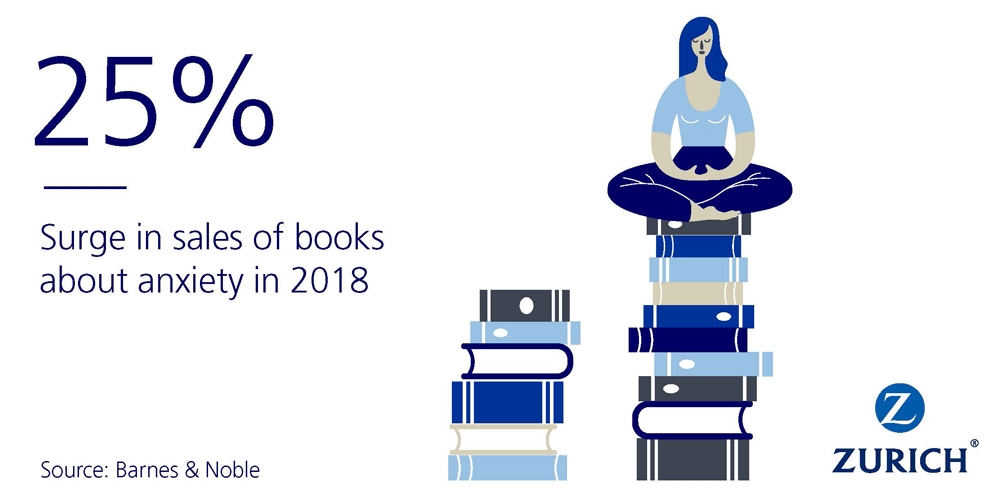Global Risks Take a High Toll on Mental Health
Global risksArticleApril 8, 2019
More than 700 million people suffer from mental health problems, creating a stress test the global economy is ill-equipped to meet.
The causes may be macro, but the effects are micro, and the warning signs are everywhere.
In the United Kingdom, 90 percent of young employees say their mental health is adversely affected by the cost of living. Forty-nine percent of American workers report feeling stressed. And in China, the number of people reporting mental health issues soared 25 percent between 2014 and 2016 to an estimated 173 million, only 20 million of whom have received professional help. (Source: Global Risks Report 2019)
Small wonder that the 2017 Gallup Negative Experience Index—a snapshot of the world’s emotional state drawn from 154,000 people in 145 countries—recorded its highest-ever levels of stress, sadness, anger, worry and physical pain. In a disruptive economy, the disrupted feel ever more vulnerable, as the pace of radical change increases while their ability to plan for and react to it decreases.
“For many people, this is an increasingly anxious, unhappy and lonely world. Complex transformations—societal, technological and work-related—are having a profound impact on people’s lived experiences,” according to the World Economic Forum’s Global Risks Report 2019. “A common theme is psychological stress related to a feeling of lack of control in the face of uncertainty.”
Noting that mental health problems now impact 700 million people worldwide, the Global Risks Report contends that the human cost of global risks —like declining psychological and emotional well-being —represents a significant threat with corrosive effects on social cohesion and politics.
“At times, we forget that societies are made up of individuals who have a range of unique needs and challenges that can easily be disrupted by a change,” says Ian Veitch, Global Head of Proposition for Corporate Life and Pensions at Zurich Insurance Group. “It does not take much to throw an individual’s finances off track, particularly given that many people now live paycheck to paycheck.”

The human cost of global risks threatens to have a corrosive effect on social cohesion and politics. The familiar downsides of globalization—trade wars that relocate jobs, automation that creates downward wage pressure—don’t feel so global when it’s your job and your wages. But the impact of these human costs isn’t limited to stress levels at home, warns Dr. Stefan Kroepfl, Zurich’s Global Head of Life Business Analysis.
He points to a report by the Organisation for Economic Co-operation and Development that found that mental health problems affect more than one in six people across the EU. “Besides the impact on people’s well-being, the report estimates the total costs of mental ill-health at over 600 billion euros, or more than 4 percent of GDP, across the 28 EU countries,” Kroepfl says.
The personal often becomes the political, and the dizzying pace of global economic change raises the specter of individual discontent metastasizing into a systemic threat, as populist sentiment, fueled by economic frustrations and divisions within multiethnic societies, leads to social and political upheaval.
Veitch believes we’re already seeing that scenario play out. “Everything—societies, countries, companies—is mainly made up of individuals coming together for a common purpose. If that contract that binds people together fails, then we will see large disruption if these people respond politically to seek radical change,” he says. “It is noticeable that a message of protecting local employment and industries has played a part in recent electoral shocks. This then challenges existing government and regulatory models—domestic and international—creating further uncertainty.”
A recent YouGov poll showed that 36 percent of young Americans had a favorable view of socialism, almost equal to the 39 percent with a positive view of capitalism, suggesting that the backlash against globalization is spurring a widespread questioning of the established economic order.
So what is the solution in a world where industries cannot halt change and governments cannot legislate wellness and empathy?
Experts say the answer has two strands: companies proactively tackling mental health issues and social isolation, and insurers helping to reinvent safety nets crucial to worker security. In short, a fundamental reimagining of the modern workplace.
“We see a number of companies already starting to address these issues at an employee level," Veitch says. "There is clear evidence that stressed and worried employees don't bring their full attention to the workforce. More secure employees are more productive."
In his view, insurance companies also have a role to play in addressing the economic and social anxiety caused by global risks. There is a growing gap between the new realities of work and the design of established social-benefit systems. Trends like the growth of the sharing economy and the increase in workers who repeatedly change employers throughout their careers point to the need for agile protection: flexible insurance and associated worker protections, provided by multiple stakeholders and tailored to individual career trajectories.
With solutions such as income protection, we have always had a role in helping fund the unexpected drop in income due to illness, which is often stress-related these days,” Veitch says. “As we go forward, we need solutions that allow people to spread income over different working patterns, with periods of employment and unemployment. I see a growing role for financial and other wellness solutions, like debt counseling, financial education and simple saving vehicles.
Kroepfl also advocates a holistic approach that goes beyond traditional financial compensation and marries prevention with rehabilitation.
“If you applied this to chronic diseases or mental health, that would mean offering customers support to remain healthy, financial support if things go wrong, but also support to recover from the condition,” he says.
That strategy applies just as much to solutions for institutions as for individuals. The underlying causes of stress—both personal and economic—demand a rigorous risk assessment that takes into account not just economic uncertainty, but also significant demographic shifts, like increased life spans.
“While this is a positive development for mankind, it challenges the sustainability of social protection systems, in particular retirement and long-term care,” says Kroepfl, who suggests that insurers might assume longevity risks of certain groups of people—for example, insuring a pension fund against the risk that its members, on average, exceed the typical life expectancy. As social support systems strain under the weight of increasing obligations, Kroepfl is candid in his assessment of what lies ahead if action is not taken to address the increasing human cost of global risks.
“Social security systems in most parts of the world will become ineffective if they are not modernized to become future-proof. There are major impacts arising from demographic change as well as the new world of working,” he says. “The question to answer is who—employer, employee, government, society as a whole or the private insurance and reinsurance sector—is bearing which risks, and to what extent.”





